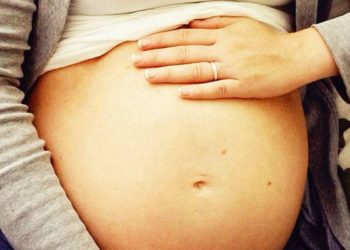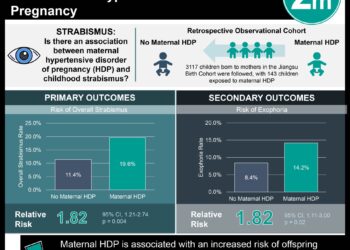Preeclampsia linked to autism and developmental delay
1. Women with preeclampsia were more likely to have a child diagnosed with autism spectrum disorder.
2. Women who experienced severe preeclampsia with placental insufficiency were more likely to have a child with developmental delay.
Evidence Rating Level: 3 (Average)
Study Rundown: Autism spectrum disorder (ASD) and developmental delay (DD) are issues affecting many children and their caregivers. ASD is a neurodevelopmental disorder characterized by deficits in social interaction and repetitive patterns of behavior, interests or activities. DD is a term used to classify children who do not meet developmental milestones in gross motor, fine motor, language or social domains. While the pathogenesis of ASD and DD are currently not well understood, they are thought to be multifactorial and their pathways may overlap. Environmental factors during fetal development are posited to play a role, and conditions such as infection, hypoxia and nutrient deficiency may increase the risk for ASD and DD. Prior studies evaluating preeclampsia as a risk factor have yielded mixed and inconclusive results. The present work sought to determine whether preeclampsia was associated with ASD and DD and, if so, whether preeclampsia severity or placental insufficiency further increased the odds of ASD and DD. The authors found that ASD was associated with preeclampsia in a dose-dependent fashion and that DD tracked with placental insufficiency.
Strengths of this study were a large population-based design and collection of both subjective and objective data. Weaknesses included case-control design, which introduces opportunity for recall bias and precludes insight into causality. Further prospective studies are needed to further evaluate the association of preeclampsia and placental insufficiency and ASD and DD.
Click to read the study in JAMA Pediatrics
Relevant Reading: Perinatal risk factors for infantile autism
In-Depth [case-control study]: This study evaluated preeclampsia and placental insufficiency in mothers of children with ASD (n=517), DD (n=194) and normal development (n=350). A diagnosis of autism was confirmed using the Autism Diagnostic Observation Scale and Autism Diagnostic Interview-Revised; children with DD were screened for autism with the Social Communication Questionnaire. The primary exposures of interest were preeclampsia and placental insufficiency, which were measured through chart review and self-report. The dose-response relationship between severity of preeclampsia and risk for ASD and DD was also assessed.
Children diagnosed with ASD were more likely to have mothers who experienced preeclampsia (OR 2.36, CI 1.18-4.68). A dose-response relationship was observed between severity of preeclampsia and odds of ASD (p=0.02). Women who experienced severe preeclampsia with placental insufficiency were more likely to have a child with DD (OR 5.49, CI 2.06-14.64).
More from this author: Misoprostol not linked to peripartum asthma exacerbations, Non-surgical outpatient treatment for CIN shows promise, Obstetric scoring systems overestimate cases of severe sepsis, Vitamin D deficiency linked to preeclampsia, Cervical ripening with isosorbide mononitrate linked to increased side effects
Image: PD
©2014 2 Minute Medicine, Inc. All rights reserved. No works may be reproduced without expressed written consent from 2 Minute Medicine, Inc. No article should be construed as medical advice and is not intended as such by the authors, editors, staff or by 2 Minute Medicine, Inc.









